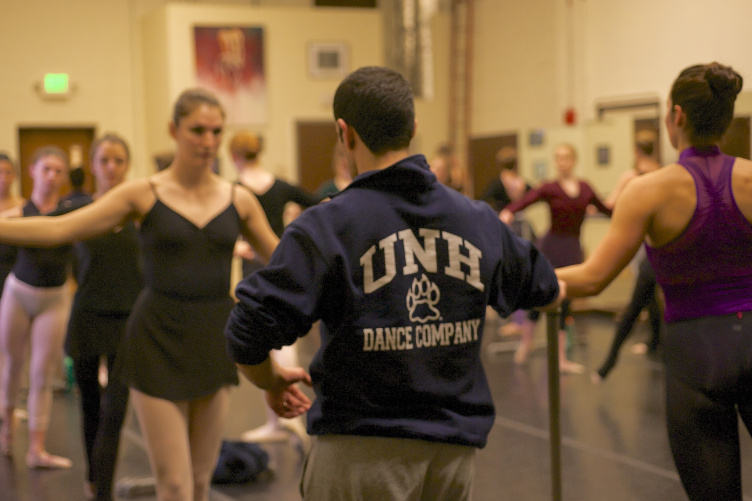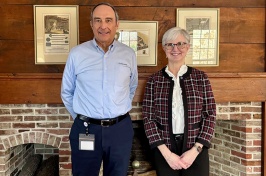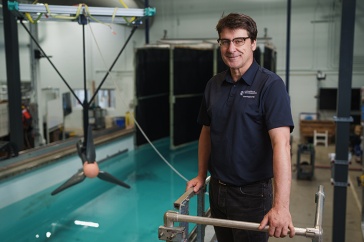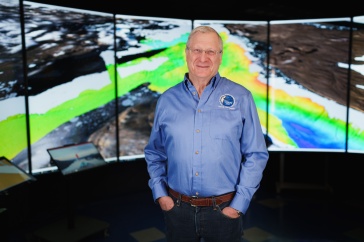
Assaf Benchetrit didn’t even make it through the interview at a computer software company before he knew it wasn’t for him. Not just the job, the career.
Matthew Leonard ’97 ‘03G had his revelation a year into a Master of Fine Arts in theatre program at the University of Wisconsin-Milwaukee.
Benchetrit, a UNH assistant professor of dance, has dual undergraduate degrees in dance and computer science and a Master of Fine Arts in dance. Leonard, who works as a software engineer for Facebook, has a bachelor’s degree in theatre and dance and a master’s degree in computer science.
So, similar majors, different outcomes.
Leonard started at UNH in the computer science field. A year later he switched to liberal arts, taking an acting class as an elective that prompted the department chair to suggest he consider theatre as a major.

“Theatre was fun, exciting and most appealingly, it had a strong community feel,” Leonard says. “I made some genuine friends that I still have to this day.”
Despite the switch in major, Leonard continued to work as a satellite instrument operator at UNH’s Institute for the Study of Earth, Oceans, and Space, allowing him to keep his hands in the technical field. But it wasn’t until he was in Milwaukee working toward his MFA that he knew the tech arena was where he wanted to be.
“I realized I did not have the drive I needed to be successful in theatre. The stark reality is that you need to really, really love theatre and make a lot of sacrifices if you want to earn a living at it. I was more excited by technology and the emerging World Wide Web,” he says.
For Benchetrit, excitement came through dance, a passion he discovered while attending a conservatory high school in his native Israel. A car accident a few years earlier had made communication difficult, leading him to the arts.
“With music and dance, words aren’t required,” Benchetrit says.
He started taking ballet when he was about 16 and, with the help of an award from the Israeli government, continued to dance during a mandatory three-year stint in the Israeli army.
“I thought, ‘Ok, this is good, but I probably will need to go on to school after I get out,’” Benchetrit says. “Most people looked at dance as a hobby. It wasn’t considered a career.”
In 2003, he spent a year at the Hebrew University of Jerusalem studying math and computer science. By then he had met his now wife, who was also a ballet dancer. Together they decided to give professional dancing a try, moving to New York, where Benchetrit joined the Joffrey Ballet. He went on to dance with, among others, the Metropolitan Classical Ballet, Alabama Ballet and Gelsey Kirkland Academy of Classical Ballet.
“I thought I would dance until I was about 30 and then do computer science,” Benchetrit says.
He continued taking computer courses. Then, in 2010, Benchetrit returned to Israel to pursue a career in his father’s biotech business. But instead of feeling settled, he found himself questioning the decision.
“I realized it would take a long time to learn his profession and I was feeling a little discouraged. Then it occurred to me that I already had a profession. I had to step away from dance to see it,” he says.

Back in the United States, Benchetrit finished his studies at Montclair State University in New Jersey, earning a Bachelor of Science in computer science and a Bachelor of Fine Arts in dance.
“After my graduation, I completely realized that I belong to the dance world,” he says.
He began looking for teaching jobs, landing work at four universities including Columbia and Rutgers before going on to get his MFA and then found his way to UNH, where he teaches ballet, dance history, dance technology and dance pedagogy.
Leonard’s career path was more direct. After earning his master’s degree from UNH in 2003, he landed a job in Arizona working for Boeing. Five years later, his employer, General Dynamics, sent him to Afghanistan where he wrote a personnel-tracking system for the U.S. Marine Corps. “The Marines dubbed me a ‘combat software engineer’ for coding while under enemy fire,” Leonard says. He was back in Afghanistan in 2012 and 2013, writing new integration techniques for intelligence data.
He doesn’t regret the path he took. In fact, he says his theatre studies sharpened his communication skills and taught him how to collaborate with others, a key element of the Facebook culture.
“While programming requires a good amount of intense, individual focus, to be successful beyond academia one needs to balance it with working socially on a team towards a goal that is greater than the sum of its parts,” Leonard says.
Benchetrit also has no remorse about his winding career road, saying that teaching ballet is where he is meant to be.
“Each of us has an inclination and we have to follow that,” Benchetrit says. “If you don’t do something you love, you will be average. I would not want that.”
Related:
Engineering and Ballet Equal Balance for UNH Senior
-
Written By:
Jody Record ’95 | Communications and Public Affairs | jody.record@unh.edu

















































